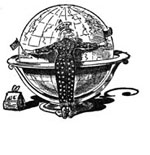
The Orientalism of Barack Obama
GUEST COLUMN
Of course the new documentary movie 2016: Obama’s America was timed by conservative intellectual and bestselling author Dinesh D’Souza to discredit President Barack Obama. Nonetheless, there can’t be much doubt that the President’s vision of America is driven by his attitude toward the perceived sins of European colonialism and his fear that America has now assumed that mantle. The film offers evidence that this is Obama’s vision while suggesting what America would look like by the year 2016 should he be re-elected.
To support this portrayal of Obama, the film begins by showing that he returned a bust of Winston Churchill that was given to President George W. Bush by the British after 9/11. According to President Obama, his Kenyan grandfather was tortured and imprisoned by the British, though David Maraniss, a sympathetic Obama biographer, discounts that story. Nonetheless, Churchill was Britain’s prime minister during a later uprising that led to Kenyan independence. D’Souza argues that this bad blood has caused Obama to hate colonialism, especially the British version. This hatred was passed on to the President by his father, Barack Obama Sr.
But Obama’s father deserted him and later only saw him once more during a month-long visit when the future President was ten years old. Besides that, psychological explanations based on long-ago events are always tricky, permitting observers to come to opposite conclusions based upon exactly the same evidence.
A simpler and more direct explanation is that Obama’s attitude toward colonialism was influenced by his professors and the intelligentsia, that herd of independent thinkers who passionately share the same view and around whom Obama has spent his adult life.
You May Also Enjoy
A great danger of "diversity" is its apparent sweetness, and it appeals to those who wish to avoid the hard work of judging moral and political perplexities.
What evil an artist can legitimately and accurately depict depends on the altitude from which the artist sees that evil.
Sr. Dede burst onto the national scene at the 2020 Republican convention when, dressed in full habit, she proclaimed, “I am not just pro-life, I am pro-eternal life.”

